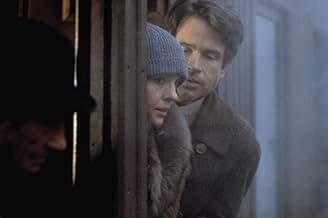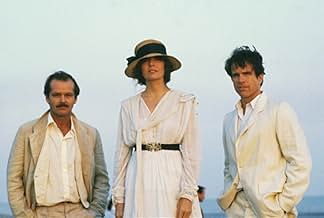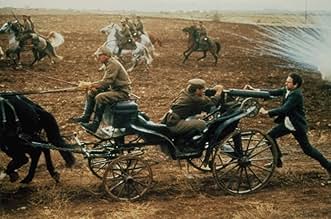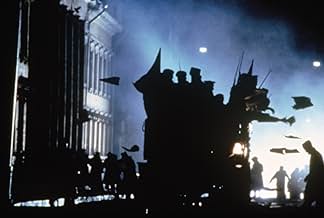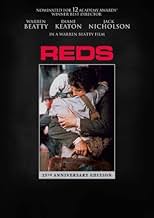IMDb रेटिंग
7.3/10
25 हज़ार
आपकी रेटिंग
अपनी भाषा में प्लॉट जोड़ेंA radical American journalist becomes involved with the Communist revolution in Russia, and hopes to bring its spirit and idealism to the United States.A radical American journalist becomes involved with the Communist revolution in Russia, and hopes to bring its spirit and idealism to the United States.A radical American journalist becomes involved with the Communist revolution in Russia, and hopes to bring its spirit and idealism to the United States.
- 3 ऑस्कर जीते
- 22 जीत और कुल 37 नामांकन
Eleanor Wilson
- Mrs. Reed
- (as Eleanor D. Wilson)
कहानी
क्या आपको पता है
- ट्रिवियाReportedly, Warren Beatty reshot some scenes up to 35 times. Paul Sorvino said he did as many as 70 takes for one scene, and Maureen Stapleton said she did as many as 80 takes for another. Reportedly, of this, she famously once said to Warren Beatty, "Are you out of your fucking mind?" This earned her a round of applause from the crew.
- गूफ़The Finnish doctor tells Reed that his blood pressure is too high, but at that time, hypertension was not considered a problem by most doctors, who did not even consider treating it. Not until the mid-'40s did doctors begin to understand the dangers of high blood pressure.
- भाव
Eugene O'Neill: If you were mine, I wouldn't share you with anybody or anything. It'd be just you and me. We'd be the center of it all. I know it would feel a lot more like love than being left alone with your work.
- क्रेज़ी क्रेडिटAs the credits roll, additional interviews with the 'witnesses' play.
- इसके अलावा अन्य वर्जनThree seconds of horse falls were cut from the British version. The DVD supplements showing these shots are also cut in England.
- कनेक्शनFeatured in Sneak Previews: Rollover, Quartet, My Dinner with Andre, Reds (1981)
- साउंडट्रैकYou're a Grand Old Flag
Written by George M. Cohan
फीचर्ड रिव्यू
Warren Beatty's magnum opus Reds was presented as a revival film official selection of the New York Film Festival 2006 to celebrate the twenty-fifth anniversary of its original appearance.
Reds's greatest virtue may be that it's grand, without being pompous, film-making. It's a film that takes some pride in being big and turbulent and unruly. It's important, but it's not tidy. It's in part certainly very much about ideology, but it avoids sharp, well-honed edges or large hard-etched "points." John Reed (played by the film's impresario, its sole producer, director, co-author, and star, Warren Beatty) was a man who happened to be able to write a first-hand account of the Bolshevik revolution, a long-time bestseller called Ten Days That Shook the World. At that time early in the twentieth century in America Reed arguably was a central figure, if only in the sense that during his time in Greenwich Village he managed to be (as he wanted to be) consistently at the center of things American political and cultural when he wasn't in Russia (which was pretty central then too). Roger Ebert thinks the movie "never succeeds in convincing us that the feuds between the American socialist parties were much more than personality conflict and ego-bruisings" (that may depend on how hard we need to be convinced to begin with), but we do care about Reds (Ebert thinks) as "a traditional Hollywood romantic epic, a love story written on the canvas of history, as they used to say in the ads it is the thinking man's Doctor Zhivago, told from the other side, of course." What about the choice of Warren Beatty and Diane Keaton as the lovers? Initially that may seem an odd and chemistry-poor decision. (I'm not sure I overcome that impression.) But arguably the film takes long enough with each of its main characters to make them into rounded people, complex enough to be attractive to others and to each other. Beatty uses the romance to hold the story together, and in doing so, he follows a conventional enough scheme. Reds stands out from other American mainstream products and for all its maverick central force, it remains that in its attempt to deal seriously with complex socio-political events during a turbulent period, and to approach them in an open-minded way. Beatty weaves other significant characters into the fabric of his drama, notably the leftist activist Emma Goldman (Maureen Stapleton, who got the Oscar for Best Supporting Actress) and the radical editor Max Eastman (Edward Herrmann), who are members of the same political-intellectual salon into which he brings Louise, as is the playwright Eugene O'Neill (Jack Nicholson).
Beatty's filmic recreation of John Reed is good in not being too serious or too idealized: in having a silly side Beatty's Reed perhaps has something of himself. Reed's lover Louise Bryant (Keaton), though originally a bourgeois lady from Portland, is similarly rounded; she's led by her relationship to Reed to develop other facets and strengths, and further enlarged as a personality through the way the film depicts her long affair with the alcoholic O'Neill, played by a toned-down but emotionally potent Nicholson. His discontent and negative energy are disturbing. Personalities anchor the film; but in some of the political debates and adventures one loses track and forgets why Reed is somewhere in Russia. He is at the center of things. But why he is where he is otherwise at certain moments is uncertain. In its ambition to keep juggling the many balls of major personalities and major political currents and historical events, Reds loses some of its narrative clarity and momentum over time. Complex political and historical currents are tracked, but the emotional trajectory loses its momentum. Nonetheless the film develops sweep in its length of three and a quarter hours. One walks out convinced that the material was complex enough to be worthy of such length, even if Beatty and his co-writer Trevor Griffiths could not whip it all into shape.
Whether it's all worth it on the stage of international cinema or not, this is a film of historical interest as a great independent project, begun logically in the Seventies, but completed right in the middle of Hollywood by an American intelligent and engaged enough to be star, director, writer, and producer, to raise $35 million to do it, and to make more or less the movie he wanted to make right in the middle, so to speak, of a wave of conservatism and yuppiedom, in the early Eighties, when people were thinking about making money and making it, when Ronald Reagon was President of the United States. What more appropriate time to reexamine this achievement than in the middle of the second term of George Bush II? No doubt Beatty took on this story because he was interested in a time in America when it was rife with left-wing politics. But he is realistic, and he made a Hollywood movie, with big stars and romance. And that's what it is and remains. But one can't imagine anybody else making it, and that's what makes it worth revisiting. Warren Beatty is an admirable maverick in the clone-heavy world of Southern California media-moguldom. He's a real person. And this is his great performance as a person and as an artist. I first saw it with a group of real communists. "We're "reds," they said as we walked out. The theater staff looked impressed. I was bowled over by their pride. Not everyone watches this film as a "traditional Hollywood romantic epic." It would never have been made if that were all it was. Its grandeur and ambition are still moving and it must not be forgotten. For a more pungent treatment of a political and social theme starring Beatty, consider Hal Ashby's 1975 Shampoo.
Reds's greatest virtue may be that it's grand, without being pompous, film-making. It's a film that takes some pride in being big and turbulent and unruly. It's important, but it's not tidy. It's in part certainly very much about ideology, but it avoids sharp, well-honed edges or large hard-etched "points." John Reed (played by the film's impresario, its sole producer, director, co-author, and star, Warren Beatty) was a man who happened to be able to write a first-hand account of the Bolshevik revolution, a long-time bestseller called Ten Days That Shook the World. At that time early in the twentieth century in America Reed arguably was a central figure, if only in the sense that during his time in Greenwich Village he managed to be (as he wanted to be) consistently at the center of things American political and cultural when he wasn't in Russia (which was pretty central then too). Roger Ebert thinks the movie "never succeeds in convincing us that the feuds between the American socialist parties were much more than personality conflict and ego-bruisings" (that may depend on how hard we need to be convinced to begin with), but we do care about Reds (Ebert thinks) as "a traditional Hollywood romantic epic, a love story written on the canvas of history, as they used to say in the ads it is the thinking man's Doctor Zhivago, told from the other side, of course." What about the choice of Warren Beatty and Diane Keaton as the lovers? Initially that may seem an odd and chemistry-poor decision. (I'm not sure I overcome that impression.) But arguably the film takes long enough with each of its main characters to make them into rounded people, complex enough to be attractive to others and to each other. Beatty uses the romance to hold the story together, and in doing so, he follows a conventional enough scheme. Reds stands out from other American mainstream products and for all its maverick central force, it remains that in its attempt to deal seriously with complex socio-political events during a turbulent period, and to approach them in an open-minded way. Beatty weaves other significant characters into the fabric of his drama, notably the leftist activist Emma Goldman (Maureen Stapleton, who got the Oscar for Best Supporting Actress) and the radical editor Max Eastman (Edward Herrmann), who are members of the same political-intellectual salon into which he brings Louise, as is the playwright Eugene O'Neill (Jack Nicholson).
Beatty's filmic recreation of John Reed is good in not being too serious or too idealized: in having a silly side Beatty's Reed perhaps has something of himself. Reed's lover Louise Bryant (Keaton), though originally a bourgeois lady from Portland, is similarly rounded; she's led by her relationship to Reed to develop other facets and strengths, and further enlarged as a personality through the way the film depicts her long affair with the alcoholic O'Neill, played by a toned-down but emotionally potent Nicholson. His discontent and negative energy are disturbing. Personalities anchor the film; but in some of the political debates and adventures one loses track and forgets why Reed is somewhere in Russia. He is at the center of things. But why he is where he is otherwise at certain moments is uncertain. In its ambition to keep juggling the many balls of major personalities and major political currents and historical events, Reds loses some of its narrative clarity and momentum over time. Complex political and historical currents are tracked, but the emotional trajectory loses its momentum. Nonetheless the film develops sweep in its length of three and a quarter hours. One walks out convinced that the material was complex enough to be worthy of such length, even if Beatty and his co-writer Trevor Griffiths could not whip it all into shape.
Whether it's all worth it on the stage of international cinema or not, this is a film of historical interest as a great independent project, begun logically in the Seventies, but completed right in the middle of Hollywood by an American intelligent and engaged enough to be star, director, writer, and producer, to raise $35 million to do it, and to make more or less the movie he wanted to make right in the middle, so to speak, of a wave of conservatism and yuppiedom, in the early Eighties, when people were thinking about making money and making it, when Ronald Reagon was President of the United States. What more appropriate time to reexamine this achievement than in the middle of the second term of George Bush II? No doubt Beatty took on this story because he was interested in a time in America when it was rife with left-wing politics. But he is realistic, and he made a Hollywood movie, with big stars and romance. And that's what it is and remains. But one can't imagine anybody else making it, and that's what makes it worth revisiting. Warren Beatty is an admirable maverick in the clone-heavy world of Southern California media-moguldom. He's a real person. And this is his great performance as a person and as an artist. I first saw it with a group of real communists. "We're "reds," they said as we walked out. The theater staff looked impressed. I was bowled over by their pride. Not everyone watches this film as a "traditional Hollywood romantic epic." It would never have been made if that were all it was. Its grandeur and ambition are still moving and it must not be forgotten. For a more pungent treatment of a political and social theme starring Beatty, consider Hal Ashby's 1975 Shampoo.
- Chris Knipp
- 2 अक्तू॰ 2006
- परमालिंक
टॉप पसंद
रेटिंग देने के लिए साइन-इन करें और वैयक्तिकृत सुझावों के लिए वॉचलिस्ट करें
- How long is Reds?Alexa द्वारा संचालित
विवरण
- रिलीज़ की तारीख़
- कंट्री ऑफ़ ओरिजिन
- भाषाएं
- इस रूप में भी जाना जाता है
- Comrades
- फ़िल्माने की जगहें
- Senate Square, हेल्सिंकी, फ़िनलैंड(on location)
- उत्पादन कंपनियां
- IMDbPro पर और कंपनी क्रेडिट देखें
बॉक्स ऑफ़िस
- बजट
- $3,20,00,000(अनुमानित)
- US और कनाडा में सकल
- $4,03,82,659
- US और कनाडा में पहले सप्ताह में कुल कमाई
- $23,25,029
- 6 दिस॰ 1981
- दुनिया भर में सकल
- $4,03,82,788
इस पेज में योगदान दें
किसी बदलाव का सुझाव दें या अनुपलब्ध कॉन्टेंट जोड़ें



